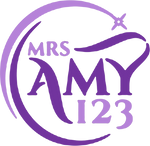
During a PD sessions I attended once, a leading teaching spoke about teaching vocabulary and how she felt it had been the main reason her school had had an increase in their schools NAPLAN results (Australia's standardized testing) and had made a dramatic difference in both their reading and writing.
Our principal then tasked us with trying this in our classrooms.....I tried it her way....then started tweaking it as I didn't find the time she spent on it (30 minutes to an hour every day!) worth the results I was getting in my classroom.
Through trial and error this is the way I would now teach vocabulary to year 3's and above.
I decreased the amount of words I was expecting my students to learn to only 24 a week. Practice each day only takes about 15 minutes. The activities also integrate other reading and writing skills as much as possible to maximize the effectiveness of the time spent.
Monday:
- Teacher reads through list and students echo back.
- Teacher reads list again while students rate each word (Ratings Poster) in the square box before each word.
- Teacher reads through the list and defines each word calling on students to assist for some words.
- Students read through the list with the teacher as quickly as possible.

Tuesday:
- Teacher holds up flash cards one at a time and students read each word. Occasionally define a word.
- Students complete activity.
- Students make a bracelet for one of the words they ranked a ‘2’ in previous days activity and must use that word as many times as possible that day.

Wednesday:
- Teacher holds up flash cards one at a time and students read each word. Occasionally define a word.
- Students complete activity sheet.
- Early finishers can time each other to see how quickly they can read through the list.

Thursday:
- Teacher holds up flash cards one at a time and students read each word. Go over the definitions of some of the words.
- Students play selected games from the suggested games.

Friday:
- Students write for ten minutes seeing how many times they can use the words from the list. The amount of words used correctly can be recorded for assessment purposes. Weaker writers could do this task verbally.

Extras:
- It is recommended when reading through the words that you do so in a tone or manner that helps depict the meaning of the word. This makes it more memorable and students will be more likely to remember them.
- Every time students do a writing task, challenge them to use the words in their work. Each time they use a word correctly place a tick in the star on their word list sheet. Give certificates or rewards for certain amounts used or a whole sheet.
- Have students complete the focus word sheet for 3 words they have ranked a ‘3’ or ‘4’.
I am currently teaching year 1's and had no plan of doing vocabulary with them....but then I changed my mind. I try and do a word of the day whenever we get a spare 5 minutes during out morning block.
During a 30 minute afternoon session we go through one of the lists, saying and defining the words. We swap lists every two weeks and our word of the day is selected from this list. The first list we did was words that all meant happy and we have moved on now to weather words which fits in with our HASS and Health unit.
Here are a few games you can play with vocabulary words:
Celebrity Heads: Have students randomly select a word from the list and attach it to a paper band around their head. Students can ask yes and no questions to try and work out their word. Questions should focus on meaning more than the spelling of their word. Make it more challenging by not allowing them to use the list of words for reference. Play with 5 students selected in front of the class or have all students wandering around.
Memory: Give pairs of students two copies of 10-15 of the words. Lay them all face down spread out on the ground. Students take turns turning two of them over at a time. If they get two matching words they get another turn. The students with the most matching words win.
Quick!: Individually, in pairs or as a group have students write as many of the words that they can remember of the list as possible. The students/s with the most correct words win. Ensure time is given to identify the words they missed.
Charades: Students act out a word and the rest of the class/group/partner must guess it.
Pictionary: Students try and draw a word and the rest of the class/group/partner must guess it.
Taboo: Students given verbal hints to a word and their partner/group/class must try and guess it.
Word Cline: Sort the words from the two extremes e.g. from the biggest word for biggest to the smallest word for smallest.
Categories: Sort the words into different categories such as negative/postive or parts of speech (verbs, adverbs, nouns, adjectives, other).

Below is a FREE Animal Features and Habitats Vocabulary Pack if you would like to try this approach for two weeks!
I have a years worth of vocabulary packs for a range of topics in my stores or you can get them for a great discount in this Year Long Vocabulary Bundle!




